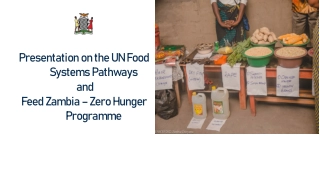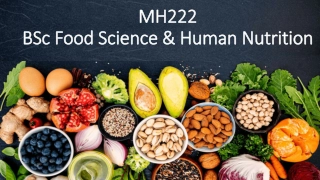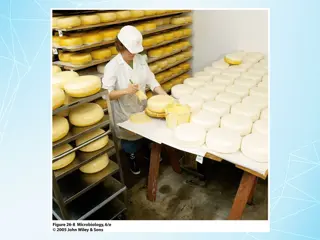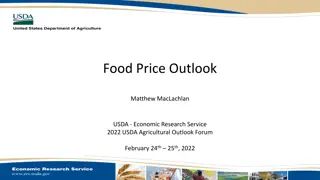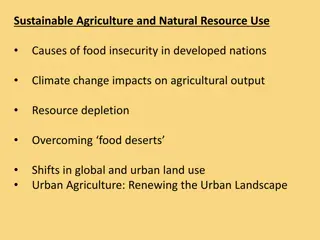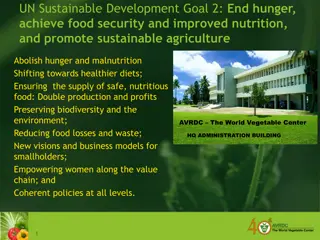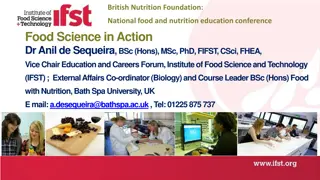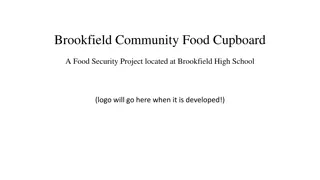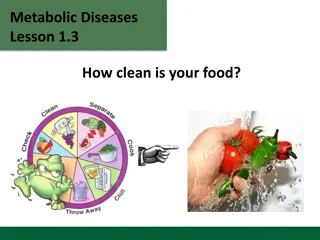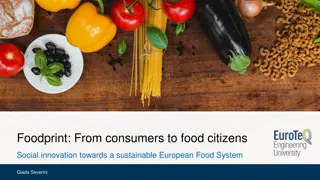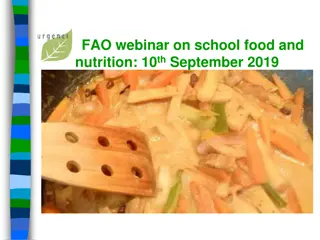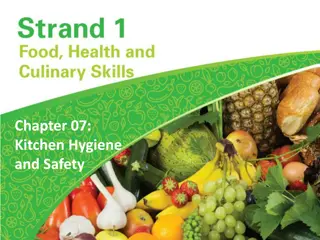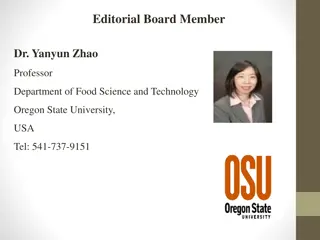
Strengthening Nordic-Baltic Youth Collaboration on Sustainable Food Systems
This project aims to enhance Nordic-Baltic youth collaboration by promoting sustainable, green, and healthy lifestyles through discovering Nordic Food Culture. By focusing on reducing overconsumption, food waste, and encouraging sustainable thinking, the project aims to improve young people's knowledge of their own food culture.
Download Presentation

Please find below an Image/Link to download the presentation.
The content on the website is provided AS IS for your information and personal use only. It may not be sold, licensed, or shared on other websites without obtaining consent from the author. If you encounter any issues during the download, it is possible that the publisher has removed the file from their server.
You are allowed to download the files provided on this website for personal or commercial use, subject to the condition that they are used lawfully. All files are the property of their respective owners.
The content on the website is provided AS IS for your information and personal use only. It may not be sold, licensed, or shared on other websites without obtaining consent from the author.
E N D
Presentation Transcript
I TRAINING Sustainable food systems in the Nordic and Baltic countries supporting sustainable and healthy lifestyles of young people 10.05 at 11.00 am 16.30 Training I part and Cocking Practice Venue: Burgarden Gymnasium 10.00 10.45 Getting to know each other and teambuilding 10.45 11.00 Project presentation Discovering Nordic Food Culture and improving sustainable consumption between young people by Green Habito 11.00 11.30 Sustainable Food system and its affordability by Vassili Golikov, SSCW 11.30 12.00 Nordic and Swedish Food Culture (basic overview) by Susanne Kallanvare, Burgarden Gymnasium 12.00 13.15 Food workshop (Practicing of cooking Swedish food at the School kitchen) 13.15 14.00 Lunch 14.00 14.45 Keynote speeches: Food habits, health and environment Swedish Food Agency representative online Danish best practices in sustainable gardening and eating habits Alejandra Adventure, Compass Danemark Finnish experience to make young people eating habits more sustainable and spreading sustainable thinking in communities Laura Maria Rajala, Green Habito Empowering sustainability as lifestyle at community level: food waste and food waste prevention in an example of consuming habits Vassili Golikov, SSCW 14.45 16.30 Working group (Mapping Food Security Challenges towards More Sustainable Food Production) German Morris, Peace Child Estonia 19.00 Dinner at the hotel
11.05 at 10.00 am 16.00 Training part II and Nordic Competition. Key topics: Healthy habits, school catering, eating green and healthy, New nordic cuisine, summary of the training and working meeting. 10.00 11.00 Fostering healthy eating habits in students through school catering: Estonian Experience German Morris, Peace Child Estonia (student of Tallinn School) 11.00 12.00 Introduction of the Nordic Youth chef competition between Finland, Sweden, Denmark and Iceland 11.00 12.00 Youth engagement in Innovative agriculture sector (The New Nordic Cuisine) Laura Maria Rajala, Green Habito RY 12.00 13.00 Working groups (discussion on the new nordic cuisine and comparative analyses) 13.00 14.00 Lunch 14.00 14.45 Working group: Creating a new Nordic-Baltic food recipe book 14.45 15.00 Conclusion of the training. 15.00 18.00 Working meeting of the partners of the Nordic-Baltic collaboration programm. 19.00 Dinner in the hotel
Discovering Nordic Food Culture and improving sustainable consumption between young people The project increases young people s knowledge about the sustainable Nordic Food Culture system and improves their habits and skills on sustainable lifestyle in our communities by changing consumption habits, healthy choices and reinforcing young people`s role as multipliers. Project partners: Green Habito RY (Finland), FGU Vest Ribe (Denmark), Compass (Denmark) Burgarden Gymnasium (Sweden), Pepp, grasr tarstarfi f lks f t kt (Iceland), Sillam e Society for Child Welfare (Estonia) and Luksia Western Uusimaa Education and Training Consortium (Finland)
The main goal of the project is to strengthen and increasing Nordic-Baltic youth collaboration on the theme of Nordic Food Culture and improving sustainable consumption between young people by promoting sustainable, green and healthy lifestyle and food habits by discovering Nordic Food Culture its traditions, recipes, developments and on the same time reducing overconsumption, reducing food waste and enhancing youth sustainable thinking. By this project we aim to increase knowledge of young people of their own Nordic Food culture and its traditions through food and collaboration, improve young people s sustainable lifestyle habits and mindset and to raise awareness on the importance of achievement of UN SDGs and the need to reduce overconsumption and food waste, as it has a huge environmental and climate footprint.
The target group is youth aged 14-31+ from Nordic countries+Estonia and representatives of educational institutions and local communities who support young people in their development. Youth will learn a lot from Nordic food culture, which is known for its focus on seasonal and locally sourced ingredients, as well as its emphasis on simple and healthy preparations. One important lesson is the value of sustainability and environmental consciousness. Nordic cuisine celebrates the use of locally sourced ingredients, which reduces the carbon footprint associated with food production and distribution. Additionally, young people will learn to appreciate the natural rhythms of the environment and the importance of respecting the earth s resources and consumption. Nordic cuisine is often associated with communal meals, where friends and family come together to share food and conversation. This promotes a sense of belonging and social cohesion that is important for young people s mental health and well-being.
Many Nordic dishes have been passed down through generations, and preparing and sharing these dishes can help young people feel a connection to their heritage and history. Overall, Nordic food culture offers many valuable lessons for young people, including sustainability, community, healthy eating habits, and cultural heritage. It s important to engage young people who will become a multiplier that will improve their own friends and communities habits and reduce overconsumption to be more sustainable and care about food waste. Sustainable lifestyles of young people should reflect specific cultural, natural, economic and social heritage of Nordic society.
Local workshops conducted by each partner (April- May 2024) Two international trainings in G teborg (9-12. May 2024) and Tallinn (6 9 June 2024) in fields of cooking, health, consuming, sustainability, culture; and competition between young people will lead to the process of changing the habits of engaged groups on more sustainable lifestyle that will create a network of sustainable multipliers who will work to improve young people sustainable thinking and living to be an actors of change and improve their knowledge on Nordic Food Culture
International Conference and side events in Ribe, Denmark (16-19.Sep 2024) what includes panel discussion, workshops, trainings, conclusion of project activities & presentation of project outcomes. A holistic ecosystem approach to production is indispensable: the interlinkages between food, health, water, soil, forest and energy is a key consideration at the conference. Conference is willing to share Nordic-Baltic experiences, innovations and best practices in transforming food systems to more sustainable ones and look at the systematic nutrition education guides healthy and nutritious eating habits (schools meals and nutrition education). School-based nutrition education is a Nordic tradition that is relevant in a global context.
Project results: The project s positive results and person-based improvements will impact three sustainability pillars: environmental, social, and economic. Young people will join a sustainability nonformal network of young activists promoting the importance of supporting sustainability in their own community and being agents of change who will build social cohesion within communities. Partners will spread the Nordic countries food culture, habits and sustainability approaches (reducing food wast, improving youth consumptions) experts and young people will share they skills and knowledge, professionalism and practical experience in Nordic Food culture and 17 sustainable development goals by promotion of local initiatives and raising awareness of importance of SDGs especially in to see green, competitive, and socially sustainable Nordic and Baltic Region. Each Individual will have the skills to meaningfully participate, spread, and protection own nature, health and sustainable way of living in a democratic society increases their skills and knowledge of how to participate in a democratic society by promoting UN SDGs, green and sustainable lifestyle, reduce overconsumption and food waste, increase of healthily food and heritage of Nordic Food Culture, improve knowledge on gender roles (how to avoid gender-based stereotypes at home and empower men and women) to a new understanding of social roles and importance of diversity. Increased awareness and engagement towards sustainable living and sustainable choices among youth etc. Participants will gain positive experience in Nordic sustainable living and food recipes and exchange their experience and vision of a green future with each other, stakeholders, and mentors. Diverse communities work together around common agendas, building trust and positive perspectives on sustainability, community, healthy eating habits, & cultural heritage. Young people and Institutions will build social cohesion Nordic collaboration in sustainable living, consumption and cooking will boost young people s self-esteem by providing a sense of accomplishment, creativity, independence, social connections, and purpose.
Sustainable Food system and its affordability
Food systems (FS) encompass the entire range of actors and their interlinked value-adding activities involved in the production, aggregation, processing, distribution, consumption and disposal of food products that originate from agriculture, forestry or fisheries, and parts of the broader economic, societal and natural environments in which they are embedded. The food system is composed of sub-systems (e.g. farming system, waste management system, input supply system, etc.) and interacts with other key systems (e.g. energy system, trade system, health system, etc.). Therefore, a structural change in the food system might originate from a change in another system; for example, a policy promoting more biofuel in the energy system will have a significant impact on the food system.
A sustainable food system (SFS) is a food system that delivers food security and nutrition for all in such a way that the economic, social and environmental bases to generate food security and nutrition for future generations are not compromised. This means that: It is profitable throughout (economic sustainability); It has broad-based benefits for society (social sustainability); and It has a positive or neutral impact on the natural environment (environmental sustainability). A sustainable food system lies at the heart of the United Nations Sustainable Development Goals (SDGs). Adopted in 2015, the SDGs call for major transformations in agriculture and food systems in order to end hunger, achieve food security and improve nutrition by 2030. To realize the SDGs, the global food system needs to be reshaped to be more productive, more inclusive of poor and marginalized populations, environmentally sustainable and resilient, and able to deliver healthy and nutritious diets to all. These are complex and systemic challenges that require the combination of interconnected actions at the local, national, regional and global levels.
A food system must be considered in the context of rapid population growth, urbanization, growing wealth, changing consumption patterns, and globalization as well as climate change and the depletion of natural resources.
These results include the expansion of off- farm employment opportunities as food industries have developed, and the widening of food choices beyond local staples, thus satisfying consumers preferences in terms of taste, form and quality.
Every day, Nordic citizens connect with local, national, and global food systems. Food is a central part of our wellbeing, life, and culture; but the food we consume can also have a negative impact on our health and the health of our planet. Transitioning our food systems to become healthy and sustainable is a necessity for achieving the goals set out in the Nordic vision and Agenda 2030.
Food Food loss and waste production and supporting diet Behaviour change Physical activity Healthy and sustainable diets Sustainable Food system Overweigh
Healthy and Sustainable Food Systems seeks to advance these efforts and strengthen knowledge and provide policy tools for more healthy and sustainable food, as well as when different parts work together they can create a platform for dialogue and discussion on the pathways forward.
Discussion in groups: The need for behaviour change and pathways forward Influencing and cooking new food
Consumption patterns vs. Dietary guidelines Current consumption patterns in the Nordic region are not aligned with national dietary guidelines or health and sustainability targets. There is a need to shift diets for a healthier and more sustainable lifestyle. This is a global challenge and a necessity for the health of ourselves and the planet.
Principles of a Healthy, Sustainable Food System (Do You agree?) We support socially, economically, and ecologically sustainable food systems that promote health the current and future health of individuals, communities, and the natural environment. A healthy, sustainable food system is: Health-Promoting Supports the physical and mental health of all farmers, workers, and eaters Accounts for the public health impacts across the entire lifecycle of how food is produced, processed, packaged, labeled, distributed, marketed, consumed, and disposed Sustainable Conserves, protects, and regenerates natural resources, landscapes, and biodiversity Meets our current food and nutrition needs without compromising the ability of the system to meet the needs of future generations Resilient Thrives in the face of challenges, such as unpredictable climate, increased pest resistance, and declining, increasingly expensive water and energy supplies
Principles of a Healthy, Sustainable Food System (Do You agree?) Diverse in Size and scale includes a diverse range of food production, transformation, distribution, marketing, consumption, and disposal practices, occurring at diverse scales, from local and regional to national and global Geography considers geographic differences in natural resources, climate, customs, and heritage Culture appreciates and supports a diversity of cultures, socio- demographics, and lifestyles Choice provides a variety of health-promoting food choices for all Fair Supports fair and just communities and conditions for all farmers, workers, and eaters Provides equitable physical access to affordable food that is health promoting and culturally appropriate
Principles of a Healthy, Sustainable Food System (Do You agree?) Economically Balanced Provides economic opportunities that are balanced across geographic regions of the country and at different scales of activity, from local to global, for a diverse range of food system stakeholders Affords farmers and workers in all sectors of the system a living wage Transparent Provides opportunities for farmers, workers, and eaters to gain the knowledge necessary to understand how food is produced, transformed, distributed, marketed, consumed, and disposed Empowers farmers, workers and eaters to actively participate in decision making in all sectors of the system A healthy, sustainable food system emphasizes, strengthens, and makes visible the interdependent and inseparable relationships between individual sectors (from production to waste disposal) and characteristics (health-promoting, sustainable, resilient, diverse, fair, economically balanced, and transparent) of the system.
Less meat, more plant-based The Nordic Nutrition Recommendations 2023: Mainly plant-based diet recommended The Nordic Nutrition Recommendations 2023 examine the health impact of 36 nutrients and 15 food groups. They advocate a mainly plant-based diet with lots of vegetables, fruit, berries, legumes, potatoes, and whole grains. They also recommend a large intake of fish and nuts, a moderate intake of low-fat milk products, a limited amount of red and white meat, and a minimal intake of processed meat, alcohol, and processed foods with high levels of fat, salt, and sugar. https://pub.norden.org/nord2023-003/introduction.html
VEGETABLES, FRUITS, BERRIES AND POTATOES Increased intakes of vegetables, fruits and berries supported both by effects on health outcomes and environmental footprint. Higher consumption of potatoes, mainly due to environmental aspects.
NUTS, FATS AND OILS Increased intake of nuts supported both by effects on health outcomes and environmental footprint. Moderate intake of fats and oils mainly due to nutrient adequacies and low environmental impact.
https://www.youtube.com/watch?v=Znsjrr2cl Z4&t=4189s&ab_channel=NordiskSamarbejde %2FNordicco-operation
Food habits, health and environment What we eat and how we handle food affects the environment in many ways, from farm to fork. For example, by changing our eating habits we may reduce greenhouse gas emissons. At the same time, we may eat healthy and save money. Food must be handled in a more sustainable way to achieve the goals of UN in Agenda 2030. About a third of Swedish households' consumption based greenhouse gas emissons comes from food, including emissions from abroad. Other negative effects of food on the environment is related to eutrophication, overfishing and the use of pesticides. However, food can also have a positive effect on for example the agricultural landscape and biodiversity. Some foods have a greater impact on the environment, while others have less environmental impact. Consequently, the choices we make are important.
Eat well be well! A healthy, nutritious diet can help you look and feel your best, and is easier than you might think. In truth, most people know perfectly well what they should eat. It's no secret that vegetables are good for you and sugar isn't. But knowing and doing are two different things. We'll give you advice and handy tips here to make it easier for you to adopt successful eating habits that are sustainable for both your health and the environment. So you can find your own way of eating greener, not too much and be active. After all even tiny steps can make a huge difference! https://www.livsmedelsverket.se/en/food-habits-health-and- environment/dietary-guidelines/adults

